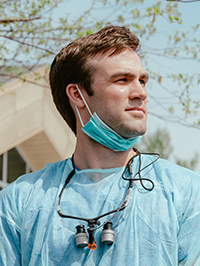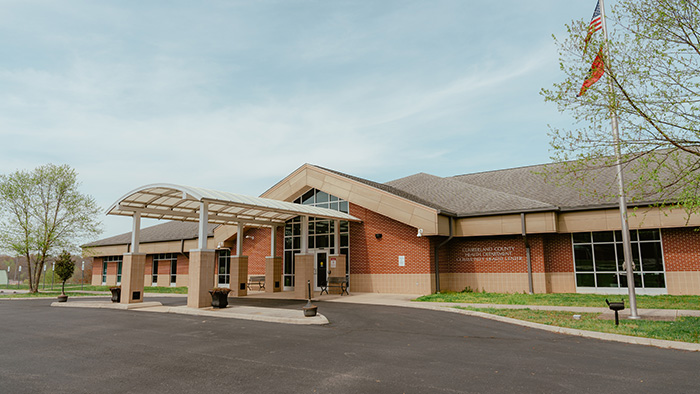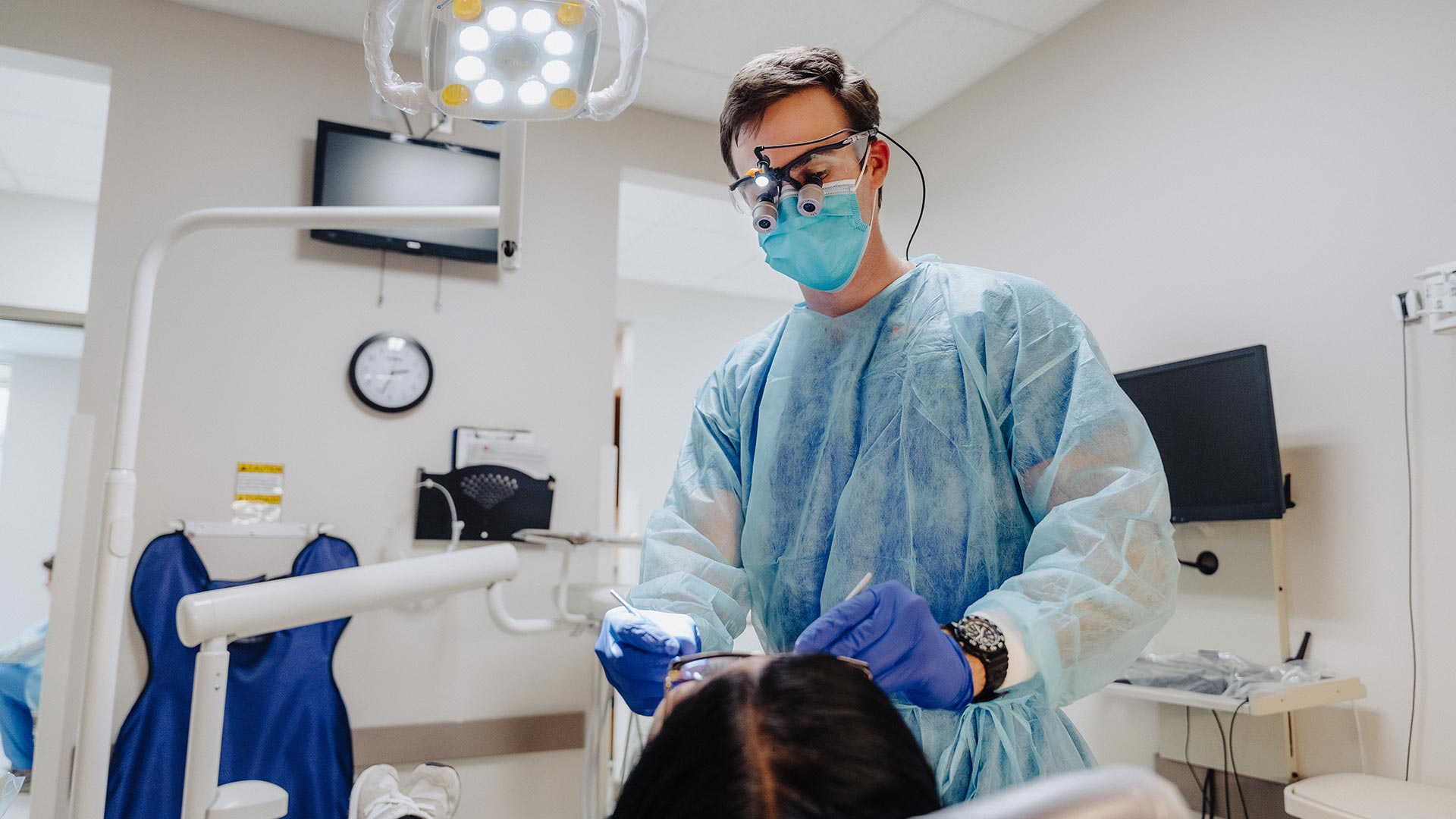Listen to this story

Third-year dental student Jeff Guenther was fresh from a two-week rotation working in a community dental clinic in Crossville as part of his training at the UT Health Science Center’s College of Dentistry.
“It’s been amazing,” the Memphis native says. “You get people from all walks of life, some with absolutely no dental exposure, some who have grown up seeing dentists from time to time, who come in, and they’re so grateful to have somebody willing to treat them and willing to give them care. It’s just been awesome to be able to provide people with what they need.”
And that is exactly the point of a statewide initiative called Healthy Smiles. The ambitious project began in Fiscal Year 2022 and aims to grow the state’s dental workforce and provide people across Tennessee, particularly those in rural areas, the oral health care they desperately need.
The state has committed $94 million over the span of the initiative for improving oral health for Tennesseans ($28.5 million for the Tennessee Department of Health; $52.9 million to UT Health Science Center’s College of Dentistry and $12.9 million to Meharry Medical College School of Dentistry).
“The cool thing about Healthy Smiles is that it’s about systemically correcting the oral health care needs of the state,” says Allen Stanton, UTHSC’s College of Dentistry administrative project manager for the Healthy Smiles Initiative.
“It’s a very exciting time to be part of our college,” says Dr. James Ragain, emeritus dean of the UTHSC College of Dentistry. “The Healthy Smiles Initiative is basically a plan to increase our outreach across the state to the underserved population. We’re putting this plan in place to increase our workforce and to extend our extramural rotations across the state.”
The numbers tell a sobering story about Tennessee’s oral health. It is a story the College of Dentistry aims to help rewrite.
- U.S. News & World Report ranks Tennessee 43rd in access to dentists for its residents and 46th in adult dental visits.
- 86 of Tennessee’s 95 counties are below the Health Policy Institute of the American Dental Association recommendation of 61 dentists per 100,000 residents.
- 26 counties have fewer than 20 dentists per 100,000 people.
- Tennessee will have an additional deficit of 800-plus dentists as the older ranks of licensed dentists retire over the next 10 years, according to American Dental Association estimates.
The Healthy Smiles Initiative attacks these numbers on several fronts.
Healthy Smiles allows UTHSC to increase the number of dental students per incoming class to 130. It is anticipated that training more dental students will eventually mean more dentists for Tennessee. The class that started in July numbers 130, making it the largest in approximately 30 years. At the same time, the dental hygiene classes are increasing to 48-50 students, with two class starts per year.

Additionally, the College of Dentistry is hiring 29 new faculty members for the dental program and eight for the dental hygiene program over the course of the Healthy Smiles grant funding. Salaries for current faculty also are increasing in line with a market analysis.
“By nurturing larger student cohorts, the college promotes interdisciplinary learning, enabling students to develop a holistic understanding of oral health care and its impact on overall wellbeing,” Ragain says. “The increased class sizes represent a commitment to address the growing demand for oral health care professionals in our communities.”
The $45 million Delta Dental of Tennessee Building, which opened on the Memphis campus in April 2023, makes accommodating and training the larger classes possible. Delta Dental of Tennessee provided $6.3 million for construction costs and $1.4 million for equipment to make the state-of-the-art building a reality.
The company’s retired Chief Executive Officer Dr. Phil Wenk (Knoxville ’73, UTHSC ’77) is the chair of UT Health Science Center’s Advisory Board. He serves as CEO of the Smile180 Foundation, a charitable arm of Delta Dental, which also is a significant collaborator on the initiative.
“It’s exciting to see the Tennessee legislature invest in the Healthy Smiles Initiative and ultimately the health of our neighbors,” Wenk says. “This project is the perfect example of a collaborative public-private partnership, as so many entities come together to increase the dental workforce in our state and work to ensure dental care is available and truly accessible.”
While educating and training future dentists is a major component of the Healthy Smiles Initiative, providing dental care to the underserved across Tennessee also is a primary focus.
This is being accomplished through expansion of UTHSC’s dental student rotations at clinics in areas of greatest need in the state. Based on the successful model of established College of Dentistry clinics in Union City in West Tennessee, as well as Chattanooga and Bristol in the eastern part of the state, new clinics have been added in Crossville and Knoxville. A clinic in Kingsport opens this summer. Other locations are being discussed.
The Healthy Smiles Initiative at UT Health Science Center
- Increased dental student class size to 130 (one class start per year)
- Increased dental hygiene classes to 48–50 (two class starts per year)
- Increasing number of dental student clinical rotations in Kingsport and Savannah. Existing clinics in Union City, Chattanooga, Bristol, Knoxville and Crossville.
- Additional graduate residency sites in Knoxville, Kingsport and Jackson.
These clinics are supervised by faculty and staffed by third and fourth-year dental students like Guenther and second-year dental hygiene students on two-week rotations, allowing them to provide high-quality dental services for the uninsured and underinsured as well as gain clinical experience.
“On the one hand, we’re increasing the dental workforce, and we’re doing that by increasing the number of dentists who are graduating,” Stanton says.
Additionally, the state is offering incentives in the form of a loan repayment program for dentists to go into rural areas to work at county health departments.
“And then we’re also trying to meet immediate needs by doing the externship (student and resident) sites, which actively see patients,” Stanton continues. “So we’re able to show them, this is what your practice will look like in a rural community, because students who are in rural communities and students who have a positive experience with rural communities are more likely to go back to rural communities upon graduation.”
Improving oral health in Tennessee takes long-term commitment and teamwork. The committee that came together to address the state’s oral health concerns continues to meet regularly to ensure the progress of the Healthy Smiles Initiative.
In Kingsport, the College of Dentistry is working with Ballad Health, Delta Dental of Tennessee, Eastman Chemical, the city of Kingsport, the Northeast Tennessee Regional Development Hub, East Tennessee State University (ETSU), BlueCross BlueShield of Tennessee and others on the collaborative dental clinic that will support the student rotations there and deliver dental care to those in need.
The Kingsport Dental Clinic of the Appalachian Highlands also will be the site of an Advanced Education in General Dentistry program, offering postgraduate dental residency training in that region. When it opens this summer, the space also will allow for clinical rotations for ETSU dental hygiene students, a major step toward a more robust and collaborative academic and clinical presence for UTHSC in East Tennessee.
This year, the Tennessee General Assembly allocated $6.5 million to the city of Kingsport for the second phase of the college’s efforts there. Current plans for Phase 2 call for a major training site in Kingsport, with up to 24 third- and fourth-year students studying full time in East Tennessee. The clinic in Kingsport has the potential to be modeled in other areas as well.
New graduate program sites are being planned in Knoxville and Jackson.
Meharry’s College of Dentistry also is making progress on its commitment to increase its class size. Additionally, the two programs already in place at federally qualified health centers across the state to provide prosthodontics (dentures and partials) for individuals under 65 and 65-plus are continuing to restore smiles and good health for qualifying Tennesseans. The program for individuals under 65 is administered at no cost to the state by Delta Dental’s Smile180 Foundation.
UTHSC Chancellor Dr. Peter Buckley commended Dr. Ralph Alvarado, commissioner of the Tennessee Department of Health, and Dr. Lisa Piercey, former Tennessee Department of Health commissioner, as well as the Tennessee Legislature for the support of the Healthy Smiles Initiative and its future impact on the health of Tennessee residents.
“Partnerships are powerful,” the chancellor says. “We can’t do what we do without our partners, and what we do is vital to Tennessee.”
Dr. Ken Tilashalski, who succeeded Ragain as UTHSC College of Dentistry on July 1, says he is excited to help build on the efforts underway to address the oral health needs of Tennesseans. “I’m grateful for Dr. Ragain, Dr. Wenk and Chancellor Buckley’s work in establishing this important initiative.”
Dental student Guenther had the opportunity to learn firsthand about the impact the Healthy Smiles Initiative is already having in Crossville.
“People who may have a fear of going to the dentist or people who may be apprehensive about receiving dental care are being able to leave here with a smile, having received great care,” he says.



